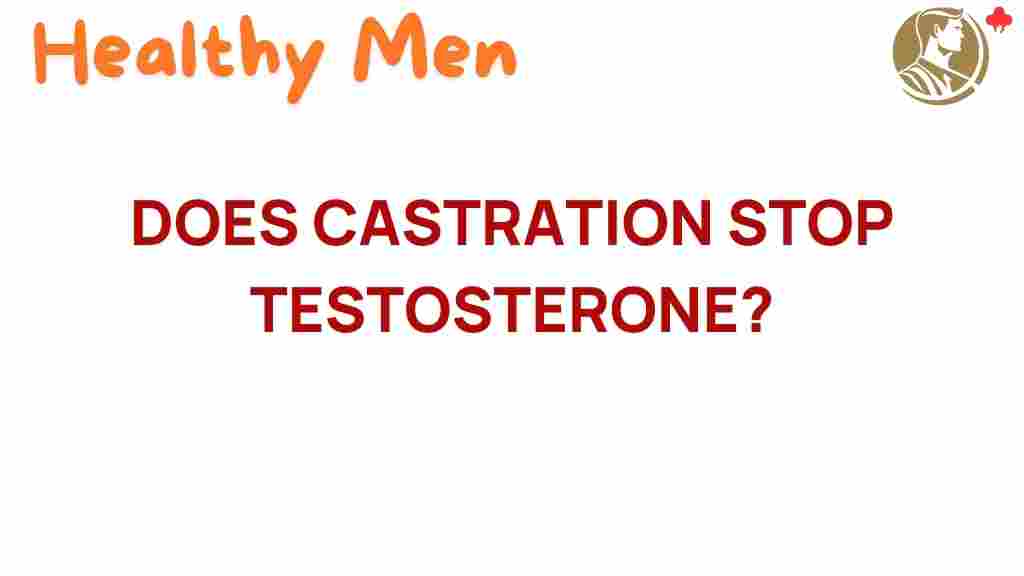The Truth About Castration: Does It Really Halt Testosterone?
Castration is a term that often evokes strong emotions and misconceptions, especially regarding its impact on testosterone levels and male health. As a surgical procedure that removes the testicles, castration has been surrounded by numerous medical myths. In this article, we will explore the truth about castration, its effect on testosterone and hormone levels, and how it relates to male health, fertility, and the endocrine system.
Understanding Castration
Castration can be classified into two main types: surgical castration and chemical castration. Each type has different implications for testosterone levels and male health.
- Surgical Castration: This involves the removal of the testicles, which produce testosterone. This procedure is sometimes necessary for medical reasons, such as treating prostate cancer.
- Chemical Castration: This method uses medication to lower testosterone levels without surgery. It is often used in cases of hormone-sensitive cancers.
The Role of Testosterone in Male Health
Testosterone is a critical hormone in the male body, influencing various aspects of health, including:
- Muscle mass and strength
- Bone density
- Sperm production and fertility
- Libido and sexual function
- Mood and cognitive function
Understanding how castration affects testosterone levels is essential for comprehending its broader impact on men’s health.
How Castration Affects Testosterone Levels
After castration, the body experiences a significant reduction in testosterone levels. This reduction can lead to various health changes:
- Hormone Levels: Following surgical castration, testosterone levels can drop to nearly undetectable levels, leading to symptoms like fatigue, depression, and decreased libido.
- Impact on the Endocrine System: The endocrine system regulates hormones in the body. The removal of testosterone disrupts this balance, potentially affecting other hormones such as estrogen and cortisol.
- Fertility Issues: Castration directly impacts fertility, as the testicles produce sperm. Men who undergo this procedure will become infertile.
Medical Myths Surrounding Castration
There are several myths regarding castration and its effects on testosterone and male health. Here are some common misconceptions:
- Myth 1: Castration eliminates all masculine traits.
- Myth 2: All men who are castrated will experience severe depression.
- Myth 3: Castration is the only treatment for prostate cancer.
It is essential to debunk these myths to provide a clearer understanding of the realities of castration.
Step-by-Step Process of Castration
The procedure for surgical castration typically involves the following steps:
- Consultation: A thorough evaluation by a healthcare provider to discuss the necessity and implications of the procedure.
- Preoperative Preparation: Blood tests and imaging may be performed to assess health and suitability for surgery.
- Anesthesia: The patient is given anesthesia to ensure comfort during the procedure.
- Surgery: The testicles are surgically removed through an incision in the scrotum or abdominal wall.
- Recovery: Post-operative care and follow-up appointments to monitor hormone levels and overall recovery.
Impact on Male Health Following Castration
Men who undergo castration may face various health challenges, including:
- Physical Changes: Loss of muscle mass, increased body fat, and changes in energy levels.
- Emotional and Psychological Effects: Potential increased risk of depression and anxiety.
- Bone Health: Risk of osteoporosis due to decreased testosterone levels.
Addressing Health Concerns Post-Castration
Men who have undergone castration should be proactive in managing their health:
- Regular Check-ups: Maintaining routine visits with a healthcare provider to monitor hormone levels and overall health.
- Hormone Replacement Therapy: Discussing the possibility of testosterone replacement therapy with a doctor.
- Healthy Lifestyle: Adopting a balanced diet and engaging in regular exercise to mitigate some physical effects.
- Mental Health Support: Seeking therapy or support groups to address emotional changes.
Fertility Considerations After Castration
One of the most significant consequences of castration is the loss of fertility. Here are some important points to consider:
- Understanding Infertility: Castration leads to the cessation of sperm production, making natural conception impossible.
- Options for Fatherhood: Men who wish to have children in the future should consider sperm banking before undergoing the procedure.
- Alternative Family Planning: Discussing options such as adoption or surrogate parenting with a partner.
Conclusion
In conclusion, the truth about castration and its impact on testosterone levels is multifaceted. While it is clear that castration significantly reduces testosterone and can lead to various health challenges, it is essential to approach the subject with factual information rather than myths. Understanding the implications of this surgical procedure is vital for men considering castration and for their overall health management.
For more information on men’s health and hormone management, consider visiting Men’s Health Network for resources and support.
As we continue to learn about the endocrine system and its complexities, staying informed empowers men to make better health choices. If you’re facing decisions regarding castration or testosterone levels, consult with a healthcare professional to discuss your options and address any concerns.
This article is in the category Conditions and created by healthymen Team
